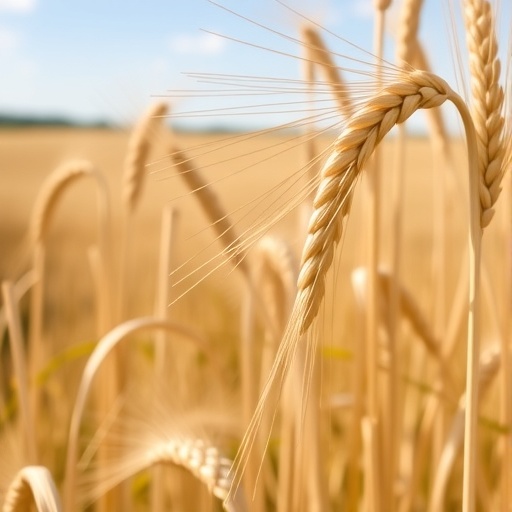In a groundbreaking study published in BMC Genomics, researchers led by Marcotuli, I., and collaboration with Soriano, J.M., and Colasuonno, P., have made significant strides in identifying novel quantitative trait loci (QTLs) associated with quality traits and yield in tetraploid wheat. This research not only advances our understanding of the genetic basis of crucial agricultural traits but also holds promise for enhancing wheat cultivation in the face of global food security challenges. The study’s findings could potentially inform breeding programs aimed at developing higher-yielding and better-quality wheat varieties.
Tetraploid wheat, known scientifically as Triticum turgidum, represents a vital component of the world’s agricultural landscape, with its various forms, such as durum wheat, underpinning many staple foods. Given the increasing demand for wheat due to population growth and changing dietary preferences, the need for improving yield and quality traits in this crop has never been more urgent. The research team utilized interspecific backcross inbred lines, a strategy that leverages the genetic diversity from related species to introduce beneficial traits into cultivated varieties.
One of the key aspects of the study involved the identification of specific QTLs linked to various traits such as grain quality, disease resistance, and yield. QTL mapping is a powerful technique that allows scientists to associate specific regions of the genome with phenotypic traits. This approach enables breeders to focus their efforts on the most promising genetic regions that could contribute to improved crop performance. By identifying new QTLs, the researchers have expanded the genetic toolkit available for wheat breeding programs.
The study employed a thorough genetic analysis that combined advanced genomic techniques and robust phenotyping methods. High-throughput genomic technologies made it feasible to scan large portions of the tetraploid wheat genome quickly. Simultaneously, detailed phenotypic evaluations ensured that the identified QTLs were indeed correlated with observable and measurable traits in the breeding lines. This dual approach not only strengthens the reliability of the findings but also enhances their applicability in real-world breeding scenarios.
Another significant outcome of the research is the identification of QTLs associated with grain quality traits, which have become increasingly important in today’s competitive market. Quality traits such as protein content, gluten strength, and overall nutritional value are paramount for both consumer satisfaction and processing requirements. The findings of this study bring hope to producers striving to meet high-quality standards while balancing yield. By using the identified QTLs, breeders may be better equipped to select for these characteristics in their breeding programs.
In addition to the potential increase in yield and quality, the research also sheds light on the genetic mechanisms underlying disease resistance in tetraploid wheat. Diseases such as Fusarium head blight and rust can severely impact wheat productivity. With climate change exacerbating the prevalence of these diseases, incorporating resistance genes through the identified QTLs becomes increasingly critical. The ability to breed for disease-resistant varieties could not only safeguard yields but also reduce the dependency on chemical treatments, contributing to more sustainable agricultural practices.
Moreover, the interdisciplinary nature of this research exemplifies the collaborative efforts required to tackle complex agricultural challenges. By integrating molecular biology, genetics, and agronomy, the researchers have paved the way for comprehensive breeding strategies that consider multiple traits simultaneously. This holistic approach is essential in modern crop improvement, where simple selection for yield alone can overlook other vital traits that contribute to a sustainable farming system.
Beyond the immediate implications for wheat breeders, the research holds broader significance for agricultural genomics. The methodologies developed and refined in this study can be applicable to other crops facing similar challenges. As global agriculture grapples with issues like climate change, resource depletion, and biodiversity loss, the frameworks established through such research can inspire innovations across diverse crop species.
As the food landscape continues to evolve, this study emphasizes the critical need for continued research in plant genetics and breeding. Investment in genomic research and the harnessing of biotechnological advancements will be essential in shaping a resilient agricultural future. By prioritizing comprehensive studies such as the one conducted by Marcotuli et al., the scientific community can contribute substantially to feeding a growing population while maintaining ecological balance.
Finally, the dissemination of this research through journals like BMC Genomics is crucial for ensuring that findings reach practitioners in the field. The open-access model of publication enhances visibility and allows for greater engagement among the agricultural community. By facilitating knowledge exchange, the potential for rapid adoption of new techniques and findings increases, driving advancements from laboratory to field.
In conclusion, the recent study identifying novel QTLs for quality traits and yield in tetraploid wheat marks a significant milestone in agricultural research. The implications of this work are profound, as they not only contribute to immediate breeding efforts but also lay the groundwork for future innovations in crop improvement. As the global agricultural landscape faces unprecedented challenges, studies like this underscore the importance of genetics in achieving food security and sustainability.
Subject of Research: Identification of new QTLs for quality traits and yield in tetraploid wheat.
Article Title: Identification of new QTLs for quality traits and yield using tetraploid wheat interspecific backcross inbred lines.
Article References:
Marcotuli, I., Soriano, J.M., Colasuonno, P. et al. Identification of new QTLs for quality traits and yield using tetraploid wheat interspecific backcross inbred lines.
BMC Genomics (2025). https://doi.org/10.1186/s12864-025-12323-0
Image Credits: AI Generated
DOI: 10.1186/s12864-025-12323-0
Keywords: Tetraploid wheat, QTLs, grain quality, yield, disease resistance, food security, agricultural genomics, crop improvement, molecular biology, sustainable agriculture.




